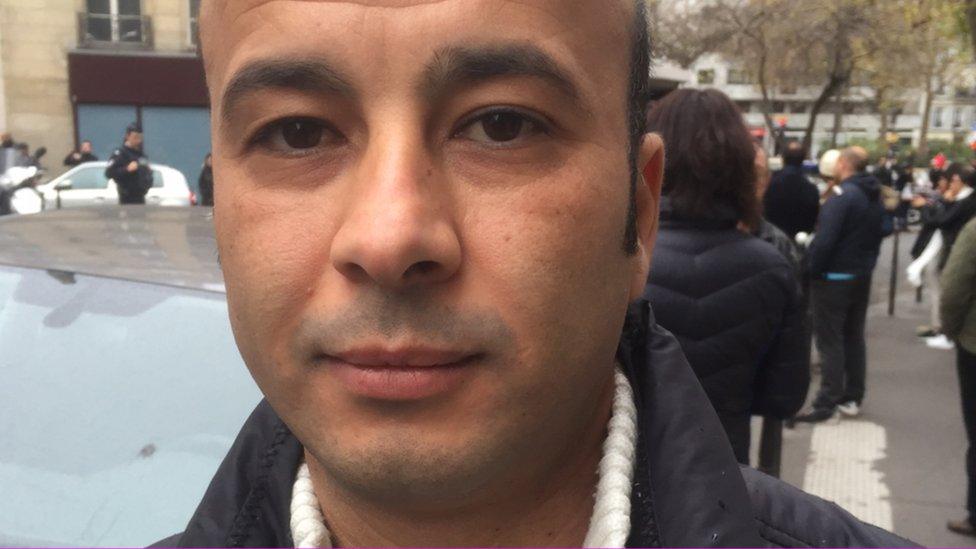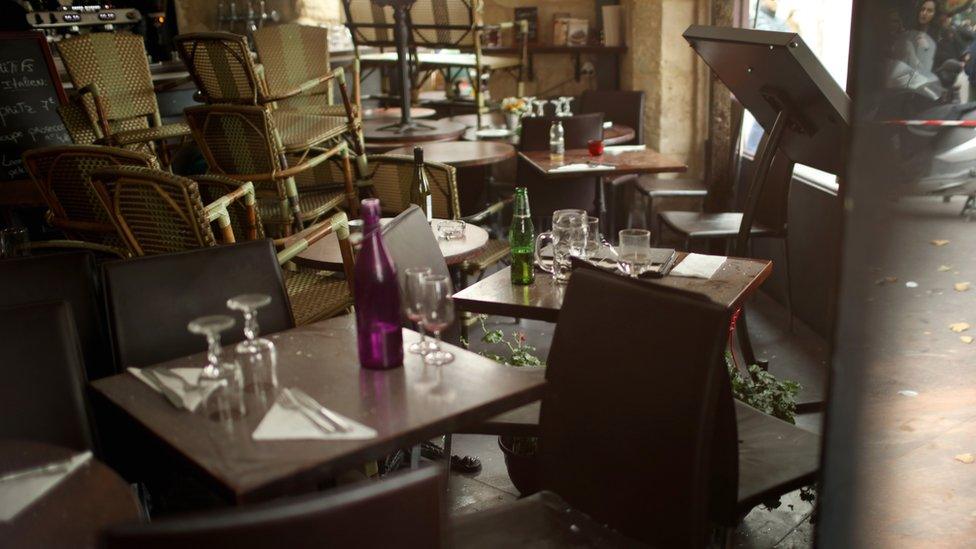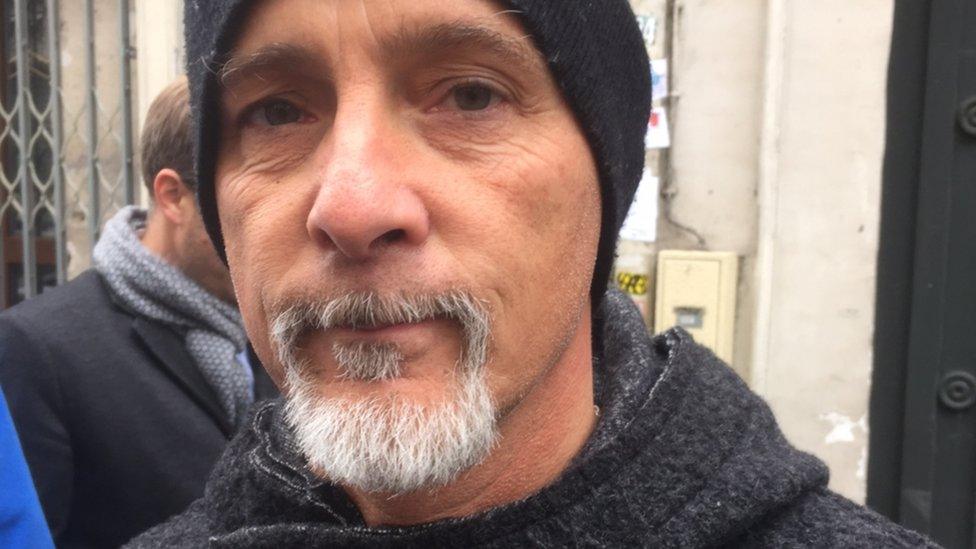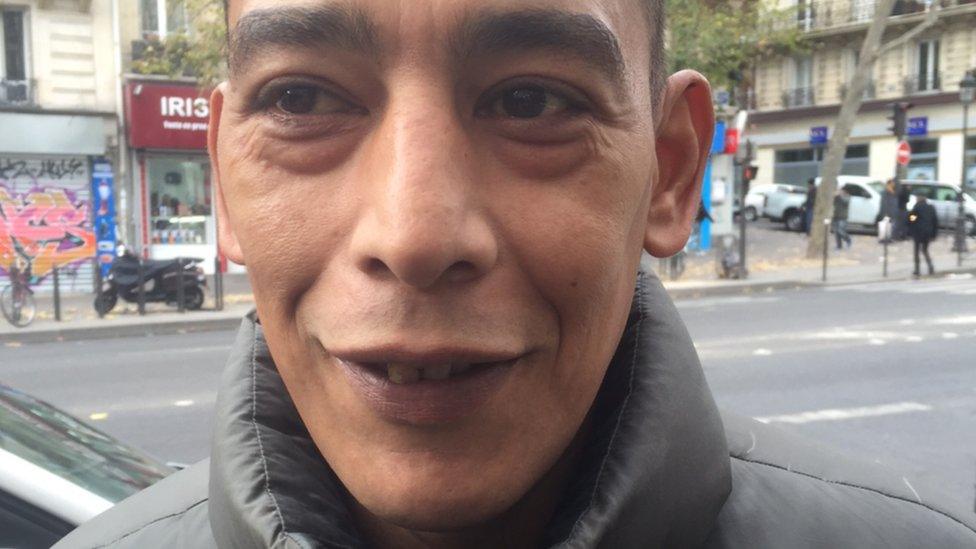Paris attacks: Restaurant worker who saved two women
- Published

Safer helped two women who were shot outside the cafe where he works
When the firing started on Friday night, Safer was at work behind the bar of the Casa Nostra restaurant in Paris.
Standing near the place where he almost died, he calmly recounts his ordeal.
"I was at the counter. We heard explosions - really loud bangs. Everyone started screaming, glass rained down on us. It was awful. There was glass all over the place, hitting us in our faces.
"I saw two women out on the terrace had been hit. One in the wrist and in the other in the shoulder. They were bleeding really badly."
Despite the obvious danger, Safer says he felt he had to help.

Remains of a Friday night shattered by violence at the Casa Nostra cafe
He waited for a lull in the firing, them ran outside to the wounded women.
"I picked them up and rushed them downstairs to the basement. I sat with them and tried to stop the bleeding.
"As we were downstairs, we could hear the gunfire continuing above. It was terrifying."
As frightening as it was, they had in fact escaped much worse.
"When we came out we saw bodies in the street. So many were injured."
Jean-Paul Lugon, 54, who lives nearby, arrived minutes after the killers had left.
He says he was in his kitchen when he heard gunshots.
"The firing lasted ages. At least two or three minutes of continued gunfire. Can you imagine? I ran down and saw three dead people on the floor.

The attacks mainly targeted venues in central Paris where large numbers of people were socialising
"I didn't want to get too close to have these images in my mind," he says. "I knew I wouldn't sleep. I have an 11-year-old. She won't go out now. It's terrible.
"I just feel so much anger," he says. "Pure anger. These are civilians - they didn't ask for this.
"I suppose I'm thankful for one thing: I was meant to meet people here last night but the plans got cancelled."
The Casa Nostra is in the eastern 11th arrondissement, which is a mixed area that is home to many Muslims and people of Arab origin. Mr Lugon says he is shocked that his neighbourhood was attacked.
"They didn't go to the 16th or 7th or other rich areas, where immigrants stand out. Why here?"

Jean-Paul Lugon says the attacks have left him angry
In the northern 18th arrondissement, one of the main Muslim quarters of Paris, the anger is palpable.
"We aren't like them," says Jamal, 44, of the attackers. "We have nothing to do with them. We are disgusted."
He is also worried about the wider impact that attacks like these have on the Muslim community.
"The French don't accept us," he says.
The role of Islam in France is a constant part of public discourse.
When it emerged that French citizens had carried out the attacks on Charlie Hebdo magazine earlier this year, questions were raised about the lives of young Muslims in this country.
Why did these people want to do so much harm in the name of God? What went wrong in their lives? Does France have a particular problem?

Jamal: "The French don't accept us"
Safer doesn't have the answers. He lives in the 11th and is a Muslim of Algerian origin.
In some ways, his story mirrors that of Lassana Bathily, a young immigrant from Mali who hid a group of frightened shoppers from the assault at the Kosher supermarket in January.
Both were Muslim, and both risked their lives for others while men claiming to represent their faith caused so much carnage.
A contrast that perhaps illustrates the complex nature of Muslim relations in France.
I asked him what he thought about the killers claiming their actions in the name of Islam.
"This has nothing to do with religion."
"Real Muslims are not made for killing people," he said. "These are criminals."